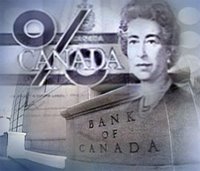
Mortage Interest Rates expected to Fall
Some of the so called "Experts" are now saying that mortgage rates will fall this year!
Many experts contend mortgage interest rates, still near their historic lows, will fall as much as 1% within the next year. Mortgage rates are generally tied to bond market yields which, in turn, are tied to the overnight lending rates that central banks such as the Bank of Canada and the U.S. Federal Reserve charge their best clients, such as major banks.
"The single most important thing ... is the U.S. short-term interest rate, determined by the Federal Reserve," says Brad Willock, senior portfolio manager with RBC Asset Management Inc.
Central bank rates in North America were near 20% in the early 1980s, then fell in the wake of terrorist attacks in 2001, to 1% in the United States and 2% in Canada. Overnight rates crept up until June, 2006, remaining on hold since then at 5.25% in the United States and 4.25% in Canada.
Financial institutions, which often try to anticipate central bank moves, reduced long-term mortgage rates slightly in recent weeks, putting fixed rates around 6.5% for terms from six months to five years, and variable rates around 6%. In its March meeting, the Federal Reserve kept its rate unchanged at 5.25%, sending out a mixed message that inflation isn't a big concern but a recession is possible.
"The unemployment rate in the U.S. is at a 30-year low, around 4.5%, and the U.S. central bank won't cut rates when it's so easy to get a job," Mr. Willock says. "But right now it appears to us, given inflation and the economy, that this rate shouldn't be this high much longer. We anticipate the rate will fall in May, June or July, down a point or so over the next year or 18 months."
Benjamin Tal, senior economist with CIBC World Markets, agrees. "We see relatively settled mortgage rates over the next few months with the potential of actually lower short-term rates, given the slowing of the U.S. and Canadian [economies]. Longer term, we believe interest rates will remain relatively low and the next peak will be lower than the previous peak."
Nick Majendie, chief portfolio manager with Canaccord Capital, also sees rates falling. "We think the economy is weakening quite rapidly and could even be close to a recession as we speak. The key reason is that the U.S. is already in recession in the housing and auto sectors. You haven't seen the bottom yet, in our view.
"I think there will be enough evidence of economic weakness by the middle of the year that it will give them the cover to reduce rates. The Fed fund rate is 5.25%. I see it staying at 5.25% until the middle of the year, then the Fed reducing that rate by 1% through to March of '08. The cost of labour has come down globally, but as China and India get more middle class, their wages will go up and that will put upwards pressure on inflation globally."
Aron Gampel, deputy chief economist with Scotiabank, feels rates will fall a bit but could spike at the hint of bad news.
"Our view is that interest rates are going to continue to move lower, probably half a percentage point, potentially even more, between now and the third quarter or year-end, when they bottom," Mr. Gampel says. "We've got the Bank of Canada easing twice, once in the third quarter and once in the fourth quarter. If you're looking at mortgage rates, the balance is shifting to slightly lower and, at worst, they will stay the same. But these markets can shift on a dime and there are a lot of risk factors out there -- a sharply weaker U.S. dollar, which could occur, could force interest rates up and limit how much rate decline you get in long-term mortgage rates."
Read more about Current Mortage Interest Rates

For more information please contact A. Mark Argentino
A. Mark Argentino, Broker, P.Eng.,
Specializing in Residential & Investment Real Estate
RE/MAX Realty Specialists Inc., Brokerage
2691 Credit Valley Road, Suite 101, Mississauga, Ontario L5M 7A1
BUS. 905-828-3434
FAX. 905-828-2829
E-MAIL: mark@mississauga4sale.com
Website: Mississauga4Sale.com
Many experts contend mortgage interest rates, still near their historic lows, will fall as much as 1% within the next year. Mortgage rates are generally tied to bond market yields which, in turn, are tied to the overnight lending rates that central banks such as the Bank of Canada and the U.S. Federal Reserve charge their best clients, such as major banks.
"The single most important thing ... is the U.S. short-term interest rate, determined by the Federal Reserve," says Brad Willock, senior portfolio manager with RBC Asset Management Inc.
Central bank rates in North America were near 20% in the early 1980s, then fell in the wake of terrorist attacks in 2001, to 1% in the United States and 2% in Canada. Overnight rates crept up until June, 2006, remaining on hold since then at 5.25% in the United States and 4.25% in Canada.
Financial institutions, which often try to anticipate central bank moves, reduced long-term mortgage rates slightly in recent weeks, putting fixed rates around 6.5% for terms from six months to five years, and variable rates around 6%. In its March meeting, the Federal Reserve kept its rate unchanged at 5.25%, sending out a mixed message that inflation isn't a big concern but a recession is possible.
"The unemployment rate in the U.S. is at a 30-year low, around 4.5%, and the U.S. central bank won't cut rates when it's so easy to get a job," Mr. Willock says. "But right now it appears to us, given inflation and the economy, that this rate shouldn't be this high much longer. We anticipate the rate will fall in May, June or July, down a point or so over the next year or 18 months."
Benjamin Tal, senior economist with CIBC World Markets, agrees. "We see relatively settled mortgage rates over the next few months with the potential of actually lower short-term rates, given the slowing of the U.S. and Canadian [economies]. Longer term, we believe interest rates will remain relatively low and the next peak will be lower than the previous peak."
Nick Majendie, chief portfolio manager with Canaccord Capital, also sees rates falling. "We think the economy is weakening quite rapidly and could even be close to a recession as we speak. The key reason is that the U.S. is already in recession in the housing and auto sectors. You haven't seen the bottom yet, in our view.
"I think there will be enough evidence of economic weakness by the middle of the year that it will give them the cover to reduce rates. The Fed fund rate is 5.25%. I see it staying at 5.25% until the middle of the year, then the Fed reducing that rate by 1% through to March of '08. The cost of labour has come down globally, but as China and India get more middle class, their wages will go up and that will put upwards pressure on inflation globally."
Aron Gampel, deputy chief economist with Scotiabank, feels rates will fall a bit but could spike at the hint of bad news.
"Our view is that interest rates are going to continue to move lower, probably half a percentage point, potentially even more, between now and the third quarter or year-end, when they bottom," Mr. Gampel says. "We've got the Bank of Canada easing twice, once in the third quarter and once in the fourth quarter. If you're looking at mortgage rates, the balance is shifting to slightly lower and, at worst, they will stay the same. But these markets can shift on a dime and there are a lot of risk factors out there -- a sharply weaker U.S. dollar, which could occur, could force interest rates up and limit how much rate decline you get in long-term mortgage rates."
Read more about Current Mortage Interest Rates
For more information please contact A. Mark Argentino
A. Mark Argentino, Broker, P.Eng.,
Specializing in Residential & Investment Real Estate
RE/MAX Realty Specialists Inc., Brokerage
2691 Credit Valley Road, Suite 101, Mississauga, Ontario L5M 7A1
BUS. 905-828-3434
FAX. 905-828-2829
E-MAIL: mark@mississauga4sale.com
Website: Mississauga4Sale.com










No comments:
Post a Comment